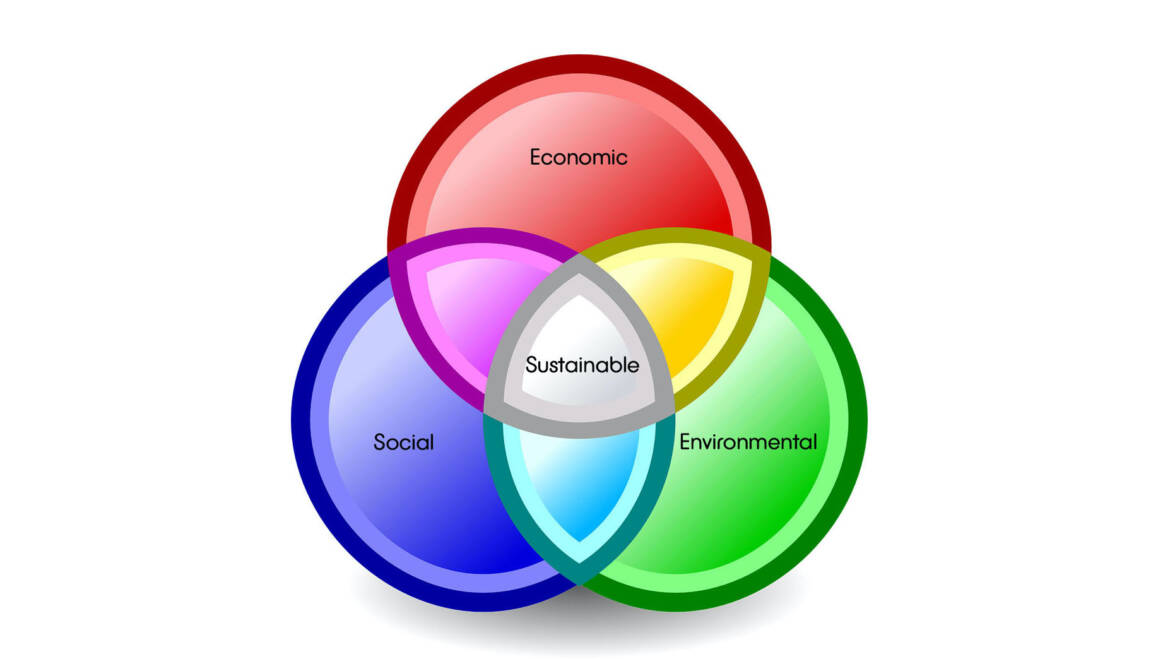Sustainability is a buzz word, and a good one at that (as it is a very important issue), but more often than not we use the term ‘sustainable’ when we in fact only mean environmentally friendly. And although often used through the best of intentions, the actual meaning of sustainability is being lost or hijacked.
The United Nations definition of sustainability refers to a development that “meets the needs of present generations without compromising the ability of future generations to meet theirs”. Sustainability is frequently presented as falling under three pillars:
- Economic – supporting economic growth without a negative impact on environmental, social and cultural facets of the community
- Social – managing the impacts of organisations on populations and their quality of life
- Environmental – interacting with the planet responsibly to conserve natural resources and avoid putting future generations needs in jeopardy
To be truly sustainable all should bear a more equal weight and organisations have a tendency to focus on one of the pillars that is more relevant to them. One television advert springs to mind for an online vintage clothing app. The one with the ‘sustainable fashion blogger’. Are they actually a sustainable fashion business or a business using sustainability for fashion? By no means am I scoffing at the attempt to do the right thing. Sure, recycling clothes has an element of sustainability but how did the items reach you? Was the transport sustainable? What did you do with the packaging afterwards? How sustainable is the technology used to blog the fashion? Once the garment is no longer required or has reached its lifespan what happens to it then?
Many of us garden designers and landscapers are aware of the environmental damages that certain choices in our industry can have but does your business impact the local community and their quality of life or just the client? What level of community involvement does it take to complete your project? If your supplies are local, did they come from a local branch of a national chain or from a family-run business? Shopping local will reduce transport effects on the environment and limit carbon footprints but if the supplier doesn’t apply the same principles, then you are possibly negating the reason for shopping local. Non-native species? Where are they coming from? Is the land that is being used to grow them impacting on communities by reducing land for crops? Do any of your other products or practices affect low-income nations, the local community or other cultures? Does it put them at a disadvantage in any way?
We are still quite a way from a circular economy where everything gets re-used and not recycled. Packaging and supply chains are known to be the worst offenders on achieving better levels of sustainability. Where does your waste go? Is any of it recyclable? Black plastic is currently not detectable by recycling machines, not because the machines cannot recognise it, it is simply a cost issue of upgrading the systems. So, black plant pots should always be given to a local nursery or returned to the supplier. Will it just go to landfill? Not all recycling stays in the UK. The Association of Southeast Asian Nations are the highest contributor of marine plastic pollution and noticed a direct increase in plastics from high-income countries, since China banned imports of plastic waste in 2018, which has exposed populations to health issues and impacted on tourism.
So instead of making a bold statement like ‘we are sustainable’ we should say ‘we aim to be as sustainable as possible’ or ‘we are placing more focus on sustainability’ this would be a much fairer statement. Yes, the environment links through all pillars but simply calling something sustainable runs the risk of defining and promoting sustainability as solely environmental when it is social and economic too and very much about the effects on people, and not just in the UK. Therefore, it would be prudent to assess how you make use of the term, if what you are doing doesn’t meet all of the UN criteria, to help ensure that the other pillars do not lose their place.

